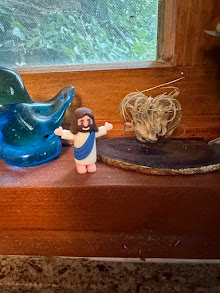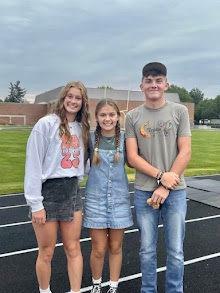My kids loved 'The Big Farm Book'. The pages are yellowed and the binding is held together with black electrical tape. When Aaron was still little, Annie found another copy, also used, pre-colored with crayons and vowels. Now I have backup.
What is the 'Big Farm Book'? It is a lovingly illustrated story of a "family farm" published back in 1976. In it, the Baxters get up at 4, eat a huge breakfast, raise all kinds of animals, go to 4-H, skate, can fruits and vegetables, attend the county fair, grow corn and raise hay. They are a multi-generation family. So far, so good.
Lots of us either grew up or raised our families with that scenario. One of the defining characteristics of farming is the idea and/or ideal of the family working together across the generations. The Big Farm Book contains some anachronisms; there is a barn raising, for instance and Mama cooks on a wood stove. I'm not sure what kind of equipment Grandpa Baxter is using to plant the corn and Ben wasn't very old before he picked up on that fact. But it isn't a paean to some kind of back to nature agriculture either; there is a two page spread showing the airplane taking off, spraying the 'protective chemicals' on the food crops, and the beetles keeling over and dying at the bottom of the page. I always appreciated the inclusion of pests into this idyllic existence. A short quote: "Yearly pest control is an important part of farming." Isn't that nice? Haven't we regressed from that sensible world view that acknowledged the battle with the elements and nature that characterizes agriculture? I always picture farmers as "wresting" a living from the earth, "wresting" close enough to "wrestling" to describe the struggle to create order, defeat weather, weeds, insects, disease, and triumphantly bring to market the stuffs humans need to survive.
Well, this is what bothers me about the current idealized vision of food production. I can't really get the job done with a hoe; shoot, I don't even do that in my own garden! I want my food warriors up there on those giant combines; I want to see piles of grain waiting for the rail cars. A giant concrete grain elevator at a terminal is as much an example of greatness and prosperity as a Chicago skyscraper.
If we can't have a prosperous economy without cities, how can we have a healthy populace without so-called industrial agriculture? If we travel a hundred miles to heal our bodies at huge medical complexes instead of our local g.p. or outpatient clinic, why do we assume a fellow with a four row planter is somehow better than an eight row planter? Why are we so hung up over the idea of scale in agriculture when we accept it as a normal fact of economic life in nearly every other occupation? Why is technology a boogie man for food when it is a miracle worker for medicine? Honestly, most people don't understand the workings of the machinery and pharmaceuticals of medicine any more than the mechanics of hybrid seed and pesticides. Why then does food bear the burden?
If we can't have a prosperous economy without cities, how can we have a healthy populace without so-called industrial agriculture? If we travel a hundred miles to heal our bodies at huge medical complexes instead of our local g.p. or outpatient clinic, why do we assume a fellow with a four row planter is somehow better than an eight row planter? Why are we so hung up over the idea of scale in agriculture when we accept it as a normal fact of economic life in nearly every other occupation? Why is technology a boogie man for food when it is a miracle worker for medicine? Honestly, most people don't understand the workings of the machinery and pharmaceuticals of medicine any more than the mechanics of hybrid seed and pesticides. Why then does food bear the burden?
I assume much of this boils down to the animal issue. I don't know if we farmers can ever convince those who equate animals and humans that we are ethical in our occupation. That chasm between farmers who raise animals for people to eat and those who consider that each individual animal a soul itself is insurmountable. A chicken is a chicken. Look into a chicken's eyes and there is nothing there. My grandchildren are people. They were individuals from birth. Nuff said.
A gentleman in an airport shuttle with us last month asked how we could get more farmers. He was speaking from the viewpoint of a small d Jeffersonian. We really unloaded on him, defending both our industry and scale. We aren't the tools of any company; we aren't even the pawns of the government. We are still very small businessmen in very small places with ties to our communities and our families. That's why we are farmers, not because we have mystic ties to the corn gods. We think its a good thing that our crops are bountiful and abundant and uniform. And that's why I still like to read 'The BIG Farm Book' to the kids.


















No comments:
Post a Comment